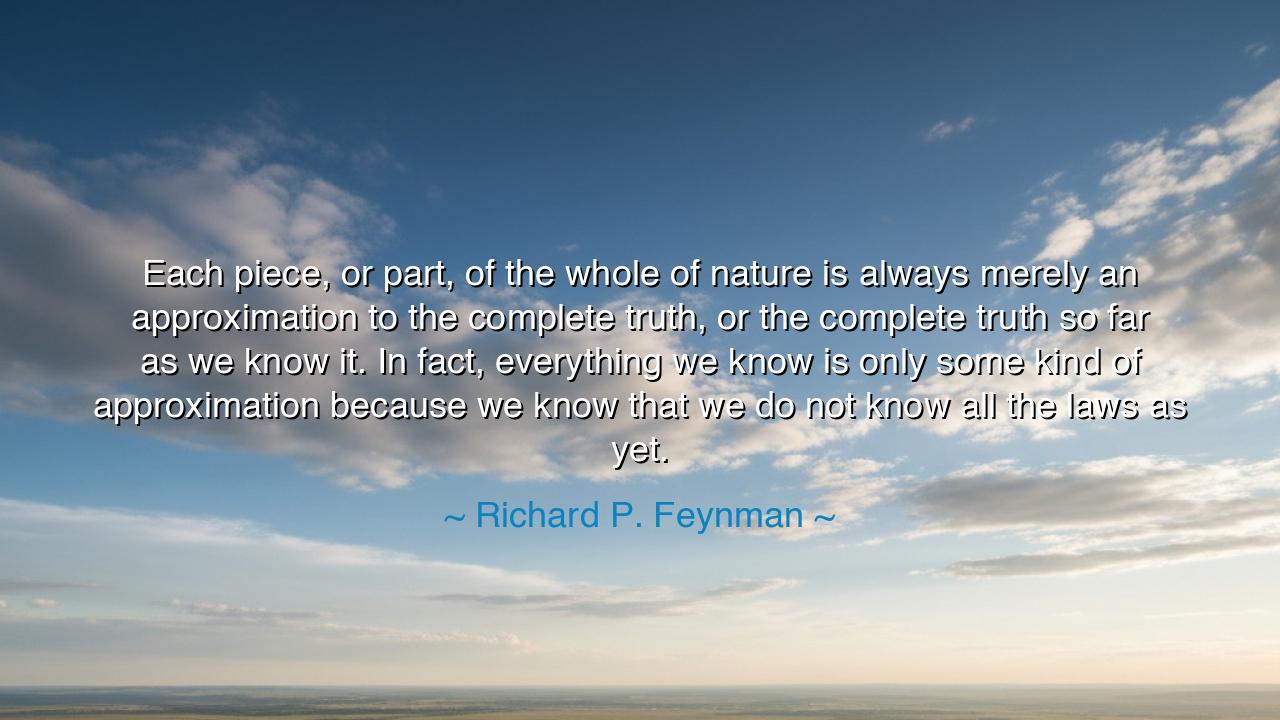
Each piece, or part, of the whole of nature is always merely an
Each piece, or part, of the whole of nature is always merely an approximation to the complete truth, or the complete truth so far as we know it. In fact, everything we know is only some kind of approximation because we know that we do not know all the laws as yet.






The physicist Richard P. Feynman, master of both science and wonder, once declared: “Each piece, or part, of the whole of nature is always merely an approximation to the complete truth, or the complete truth so far as we know it. In fact, everything we know is only some kind of approximation because we know that we do not know all the laws as yet.” In these words is contained both humility and greatness, both the yearning of man to know and the acknowledgment of his limits. For the truth of nature is vast, and the human mind, though sharp, can only carve small glimpses into the infinite fabric of creation.
The ancients, too, knew this mystery. When Socrates confessed, “I know that I know nothing,” he spoke in the same spirit as Feynman—that wisdom begins not in pride but in the recognition of ignorance. Every law we uncover, every principle we proclaim, is but an approximation. It may guide us for a time, until a deeper truth reveals itself. Just as the Ptolemaic heavens once explained the stars until Copernicus and Galileo lifted the veil, so too do today’s laws await the discoveries of tomorrow. Thus, knowledge is a ladder without end, each rung lifting us higher, yet never bringing us to the ultimate summit.
The story of Isaac Newton shines here as an illustration. Newton’s laws of motion and gravitation were for centuries the pillars of science, governing not only the apple’s fall but the sweep of planets through the heavens. Yet centuries later, Einstein showed that these laws, mighty though they were, were only approximations, true within limits but incomplete before the vastness of relativity and quantum mysteries. Did this render Newton’s work worthless? By no means! His approximations were stepping-stones, guiding humanity toward greater understanding, preparing the way for truths yet unseen.
Here we see the meaning of Feynman’s words: that every fragment of knowledge is precious, but none is final. To call something an approximation is not to despise it, but to honor it for what it truly is—a light for today, yet not the sun of eternity. The wise man delights in discovery, but he also delights in uncertainty, knowing that mystery is not his enemy but his companion. For as long as there is mystery, there is wonder, and as long as there is wonder, there is hope.
This spirit of humility is the foundation of true greatness. Civilizations that believed they knew all truth became stagnant, blinded by their own certainty. But those who admitted ignorance grew, discovered, and flourished. The Greeks questioned, the Arabs preserved and expanded, the Renaissance minds challenged dogma, and the modern age thrives because we dare to say: “We do not yet know all the laws.” Thus, the mark of a noble mind is not arrogance, but the courage to live in uncertainty while still seeking.
What, then, is the lesson for us? Let each of us hold our knowledge with both gratitude and humility. Rejoice in what you know, but beware of thinking it complete. In science, in art, in life itself, treat every conclusion as a provisional truth, a guide but not a final destination. Ask always: What more might there be? What have I not yet seen? For the soul that questions never stagnates, and the heart that wonders never withers.
Practically, we may live this wisdom by listening more than we speak, by reading not only to confirm but to challenge, by asking questions even of the simplest things. A child at play with sand or stars may glimpse truths we have forgotten. A humble worker may see wisdom where scholars grow blind. Let us then walk the world as seekers, not masters, explorers rather than conquerors, willing to embrace the beauty of approximation as we await greater light.
Thus, Feynman’s words ring as both warning and encouragement: warning us not to fall into the arrogance of final answers, and encouraging us to walk ever forward in the path of wonder. For though we may never hold the complete truth, the pursuit itself is magnificent, and the journey transforms us. To live in this way is to honor both reason and mystery, and to pass down to the generations not only knowledge, but also the fire of endless seeking.






AAdministratorAdministrator
Welcome, honored guests. Please leave a comment, we will respond soon